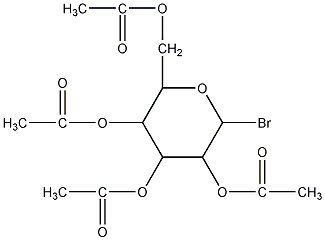
Structural formula
| Business number | 05U5 |
|---|---|
| Molecular formula | C14H19BrO9 |
| Molecular weight | 411.2 |
| label |
Acetyl bromide-alpha-D-glucose, Acetylglucose bromide, D-acetylglucose bromide, Alpha-D-tetraacetylglucose bromide, Bromoglucoside, 1-Bromo-α-D-glucose tetraacetate, Acetobromglucose, a-Acetobromoglucose, O-Acetobromoglucose, food additives |
Numbering system
CAS number:572-09-8
MDL number:MFCD00063254
EINECS number:209-339-0
RTECS number:None
BRN number:96669
PubChem number:24890582
Physical property data
1. Properties: white to yellow crystal or powder. Sensitive to light. Decomposes when exposed to water.
2. Density (g/mL, 25/4℃): Undetermined
3. Relative vapor density (g/mL, air=1): Undetermined
4. Melting point (ºC): 88-89
5. Boiling point (ºC, normal pressure): Undetermined
6. Boiling point (ºC, 5.2kPa): Undetermined
7. Refractive index: Undetermined
8. Flash point (ºC): Undetermined
9. Specific rotation (º, c= 3, in chloroform): +199.3
10. Autoignition point or ignition temperature (ºC): Undetermined
11. Vapor pressure (kPa, 25ºC): Undetermined
p>
12. Saturated vapor pressure (kPa, 60ºC): Undetermined
13. Heat of combustion (KJ/mol): Undetermined
14. Critical temperature (ºC ): Undetermined
15. Log value of oil-water (octanol/water) partition coefficient: Undetermined
16. Critical pressure (KPa): Undetermined
17. Explosion upper limit (%, V/V): Undetermined
18. Explosion lower limit (%, V/V): Undetermined 19. Solubility: Mostly soluble in methanol, easily soluble in ether, Chloroform, acetone, ethyl acetate and benzene, slightly soluble in petroleum ether.
Toxicological data
None yet
Ecological data
1. Other harmful effects: This substance may be harmful to the environment, and special attention should be paid to water bodies.
Molecular structure data
1. Molar refractive index: 81.61
2. Molar volume (cm3/mol): 275.9
3, etc.Zhangratong (90.2K): 726.2
4. Surface tension (dyne/cm): 47.9
5. Polarizability (10-24cm3): 32.35
Compute chemical data
1. Hydrophobic parameter calculation reference value (XlogP): 1.5
2. Number of hydrogen bond donors: 0
3. Number of hydrogen bond acceptors: 9
4. Number of rotatable chemical bonds: 9
5. Topological molecular polar surface area (TPSA): 114
6. Number of heavy atoms: 24
7. Surface charge: 0
8. Complexity: 507
9. Number of isotope atoms: 0
10. Determine the number of atomic stereocenters : 5
11. Uncertain number of atomic stereocenters: 0
12. Determined number of chemical bond stereocenters: 0
13. Uncertain chemical bond formation Number of structural centers: 0
14. Number of covalent bond units: 1
Properties and stability
Materials to avoid: Oxides, moisture, humidity.
Products to be decomposed: carbon monoxide and carbon dioxide, hydrogen bromide.
Storage method
1. Sealed with argon gas and protected from light, stored in a dry place at -18°C.
Synthesis method
None yet
Purpose
1. An important intermediate for manufacturing glycosides and disaccharides.
2. Biochemical reagents, main intermediates for manufacturing glycosides and disaccharides.

 微信扫一扫打赏
微信扫一扫打赏

